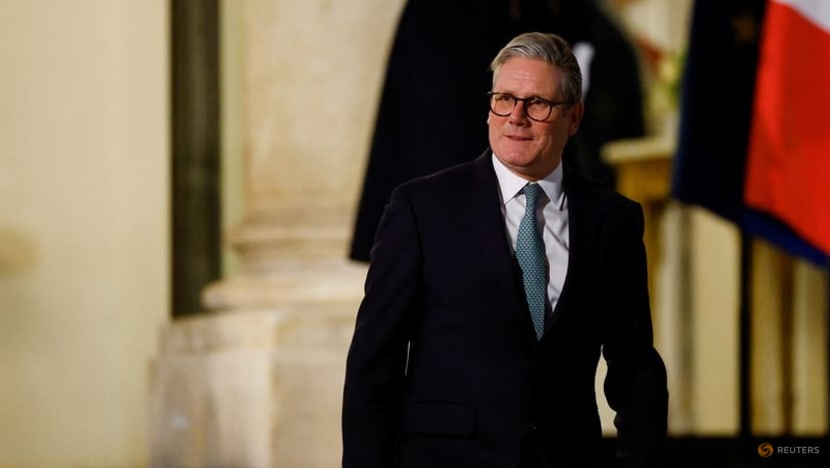UK's Starmer boosts defence spending on eve of Washington trip

Britain's Prime Minister Keir Starmer leaves after a meeting with European leaders on Ukraine and European security at the Elysee Palace in Paris, France, on Feb 17, 2025. (Photo: REUTERS/Gonzalo Fuentes)
LONDON: Prime Minister Keir Starmer said on Tuesday (Feb 25) he would increase annual defence spending to 2.5 per cent of GDP by 2027 and target a 3 per cent level last seen just after the Cold War, a signal to US President Donald Trump that Britain can boost Europe's security.
On the eve of his departure to meet Trump in Washington, Starmer told parliament he was bringing the increase in defence spending forward to offer Europe more support as the US spearheads peace talks with Russia over its war in Ukraine.
With public spending already stretched in Britain, Starmer said the increase from its current 2.3 per cent would be fully paid for by a 40 per cent cut to international aid, an announcement he said he was not happy to make but one which was necessary to offer Ukraine and Europe support in a "new era".
Since Trump seemingly abandoned the United States' more Ukraine-friendly approach to Russia's war, blindsiding much of Europe, Starmer and other European leaders have stepped up diplomatic efforts to show a united front to support Kyiv.
"Starting today, I can announce this government will begin the biggest sustained increase in defence spending since the end of the Cold War," Starmer said, adding that combined with spending on intelligence services it would reach 2.6 per cent from 2027.
"We must go further still. I have long argued that ... all European allies must step up and do more for our own defence," he said. He added that Britain would set a target for spending 3 per cent of gross domestic product in the next parliament, which will convene after a national election due in 2029.
US Defense Secretary Pete Hegseth welcomed the spending rise after speaking to British defence minister John Healey.
"A strong step from an enduring partner," Hegseth said on X.
The increase would see Britain spending £13.4 billion (US$17 billion) a year more on defence in 2027 than it does now, Starmer said, a figure which includes expected growth in GDP over the period.
He told a later press conference the extra money would help rebuild Britain's industrial base, create jobs and boost growth.
Britain's defence ministry said it spent £53.9 billion in the 2023/24 financial year.
To meet the increase in spending, the international aid budget will be cut from 0.5 per cent of gross national income to 0.3 per cent in 2027, meaning borrowing levels would not change, Starmer said.
Britain last cut its aid budget in November 2020, during an economic crisis resulting from COVID-19, reducing the level to 0.5 per cent of GNI from 0.7 per cent, a move criticised by some development groups for diminishing the nation's global influence.
"This is a short-sighted and appalling move," said Romilly Greenhill, chief executive officer of Bond, a network for organisations working in international development and humanitarian assistance.
PRE-TRUMP VISIT GAMBIT
Starmer's statement was a clear opening gambit before meeting Trump in Washington, signalling Britain will try to lead other European countries in offering more support to the US-led military NATO alliance - a demand Trump has repeatedly made, suggesting nations should spend 5 per cent of GDP.
NATO Secretary General Mark Rutte has also called on member states to step up defence spending beyond their common goal of 2 per cent of national output set a decade ago. According to NATO, Britain was the third-largest spender in cash terms in 2024, behind the United States and Germany.
Germany's likely next chancellor, Friedrich Merz, has pledged to significantly raise defence spending but will need to navigate the possibility of far-right and left parties blocking his plans.
Starmer heads to Washington, hoping to reassure Trump that Europe will provide support and security guarantees to Kyiv if peace talks with Russia are successful.
The British leader has said he is open to British troops providing security guarantees to Ukraine alongside other European nations.
Starmer also wants some form of US "backstop" for any security guarantee from Europe, which, he says, "will be vital to deter Russia from launching another invasion in just a few years' time".
"The US is our most important bilateral alliance," he said. "So this week when I meet President Trump I will be clear. I want this relationship to go from strength to strength."
He will be the second European leader to meet Trump in Washington since the president stunned its allies with his new approach to the three-year Ukraine war.
French President Emmanuel Macron held a good-humoured meeting with Trump on Monday when the two agreed on the deployment of European peacekeeping forces, although the French leader did not get a firm nod that the US would play a role.
But underlining the difference in approach between the US and Europe, Macron also corrected Trump's assertion that European nations had delivered all of their aid to Ukraine as loans, saying countries had given "real money, to be clear".
Starmer will hope that by offering to increase defence spending he might be better able to secure a promise that Washington will provide a backstop for European nations.













